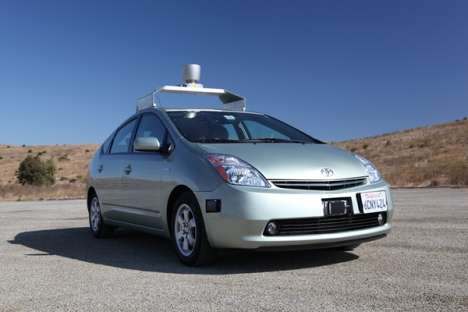Google in talks with insurers about self-driving car

A leader of Google Inc.'s driverless car project said Wednesday that the company is in discussions with major auto insurance companies about the implications of integrating its technology into real-world vehicles.
"They see the opportunities for this technology being really positive," said Anthony Levandowski, product manager for Google's self-driving car project, in a keynote address at the Society of Automotive Engineers World Congress at Cobo Center in Detroit. "From their point of view, this technology is not going to be released until it's safe."
Levandowski declined to identify the insurers Google has spoken with, but he said the talks included a discussion of whether insurance policies for autonomous vehicle owners would include different rates based on when a person is driving and when the computer is driving.
Google said in March that it had completed more than 200,000 miles of "computer-led driving" without incident. The Mountain View, Calif.-based technology giant has developed a complex software system that uses imaging, sensoring and modeling technologies to drive a vehicle mostly without help from an actual driver.
Google is one of several companies, including major automakers, that are pursuing some form of autonomous vehicle technology, including advanced cruise control, for example.
Levandowski, speaking to a group of several hundred engineers, acknowledged skeptics who say that autonomous vehicles "have always been 10 years away."
"I think it's time for us to break that cycle and actually bring them to market sooner," he said. "I don't think we need to wait 10 years for the next model or body styles to come out to build this technology."
He acknowledged that "we're not quite there yet" and that vehicles would likely never reach the point where the driver could fall asleep at the wheel for the entire ride.
But he described driverless vehicle technology as a moral imperative. He said it could eliminate a "huge chunk" of the more than 30,000 fatalities that occur in vehicle accidents every year in the U.S.
"Every year we don't have this technology built, more people die," Levandowski said.
Among the hurdles for Google - in addition to technology development - is the regulatory system. If government officials get skittish about autonomous vehicles or if insurers are scared off by liability issues, the technology could stall.
Levandowski said he's hopeful that autonomous driving technology will be "allowed as long as it's safe." Some states, including Nevada and California, have already acted to ensure that autonomous vehicles are allowed.
Levandowski, who joined Google in 2007 to help the company launch its Streetview product, said Google wants to partner with auto engineering leaders to advance the technology.
"The biggest fear is not being able to inspire you guys because we need to work together on this," he said. "The real danger is the failure of our imagination."
(c)2012 the Detroit Free Press
Distributed by MCT Information Services


















